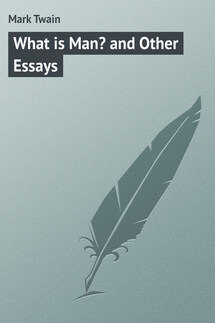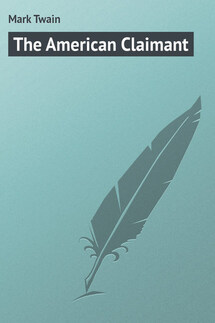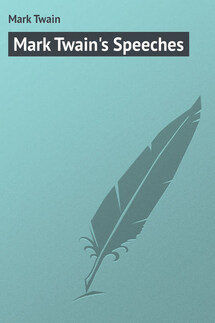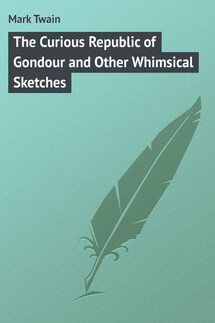Mark Twain's Speeches - страница 3
One other feature is clear – Willie Winter (for these past thousand years dramatic editor of the New York Tribune, and still occupying that high post in his old age) was there. He was much younger then than he is now, and he showed ’it. It was always a pleasure to me to see Willie Winter at a banquet. During a matter of twenty years I was seldom at a banquet where Willie Winter was not also present, and where he did not read a charming poem written for the occasion. He did it this time, and it was up to standard: dainty, happy, choicely phrased, and as good to listen to as music, and sounding exactly as if it was pouring unprepared out of heart and brain.
Now at that point ends all that was pleasurable about that notable celebration of Mr. Whittier’s seventieth birthday – because I got up at that point and followed Winter, with what I have no doubt I supposed would be the gem of the evening – the gay oration above quoted from the Boston paper. I had written it all out the day before and had perfectly memorized it, and I stood up there at my genial and happy and self-satisfied ease, and began to deliver it. Those majestic guests; that row of venerable and still active volcanoes, listened; as did everybody else in the house, with attentive interest. Well, I delivered myself of – we’ll say the first two hundred words of my speech. I was expecting no returns from that part of the speech, but this was not the case as regarded the rest of it. I arrived now at the dialogue: “The old miner said, ‘You are the fourth, I’m going to move.’ ‘The fourth what?’ said I. He answered, ’The fourth littery man that has been here in twenty-four hours. I am going to move.’ ‘Why, you don’t tell me;’ said I. ‘Who were the others?’ ’Mr. Longfellow, Mr. Emerson, Mr. Oliver Wendell Holmes, consound the lot—’”
Now, then, the house’s attention continued, but the expression of interest in the faces turned to a sort of black frost. I wondered what the trouble was. I didn’t know. I went on, but with difficulty – I struggled along, and entered upon that miner’s fearful description of the bogus Emerson, the bogus Holmes, the bogus Longfellow, always hoping – but with a gradually perishing hope that somebody – would laugh, or that somebody would at least smile, but nobody did. I didn’t know enough to give it up and sit down, I was too new to public speaking, and so I went on with this awful performance, and carried it clear through to the end, in front of a body of people who seemed turned to stone with horror. It was the sort of expression their faces would have worn if I had been making these remarks about the Deity and the rest of the Trinity; there is no milder way, in which to describe the petrified condition and the ghastly expression of those people.
When I sat down it was with a heart which had long ceased to beat. I shall never be as dead again as I was then. I shall never be as miserable again as I was then. I speak now as one who doesn’t know what the condition of things may be in the next world, but in this one I shall never be as wretched again as I was then. Howells, who was near me, tried to say a comforting word, but couldn’t get beyond a gasp. There was no use – he understood the whole size of the disaster. He had good intentions, but the words froze before they could get out. It was an atmosphere that would freeze anything. If Benvenuto Cellini’s salamander had been in that place he would not have survived to be put into Cellini’s autobiography. There was a frightful pause. There was an awful silence, a desolating silence. Then the next man on the list had to get up – there was no help for it. That was Bishop – Bishop had just burst handsomely upon the world with a most acceptable novel, which had appeared in The Atlantic Monthly, a place which would make any novel respectable and any author noteworthy. In this case the novel itself was recognized as being, without extraneous help, respectable. Bishop was away up in the public favor, and he was an object of high interest, consequently there was a sort of national expectancy in the air; we may say our American millions were standing, from Maine to Texas and from Alaska to Florida, holding their breath, their lips parted, their hands ready to applaud, when Bishop should get up on that occasion, and for the first time in his life speak in public. It was under these damaging conditions that he got up to “make good,” as the vulgar say. I had spoken several times before, and that is the reason why I was able to go on without dying in my tracks, as I ought to have done – but Bishop had had no experience. He was up facing those awful deities – facing those other people, those strangers – facing human beings for the first time in his life, with a speech to utter. No doubt it was well packed away in his memory, no doubt it was fresh and usable, until I had been heard from. I suppose that after that, and under the smothering pall of that dreary silence, it began to waste away and disappear out of his head like the rags breaking from the edge of a fog, and presently there wasn’t any fog left. He didn’t go on – he didn’t last long. It was not many sentence’s after his first before he began to hesitate, and break, and lose his grip, and totter, and wobble, and at last he slumped down in a limp and mushy pile.









